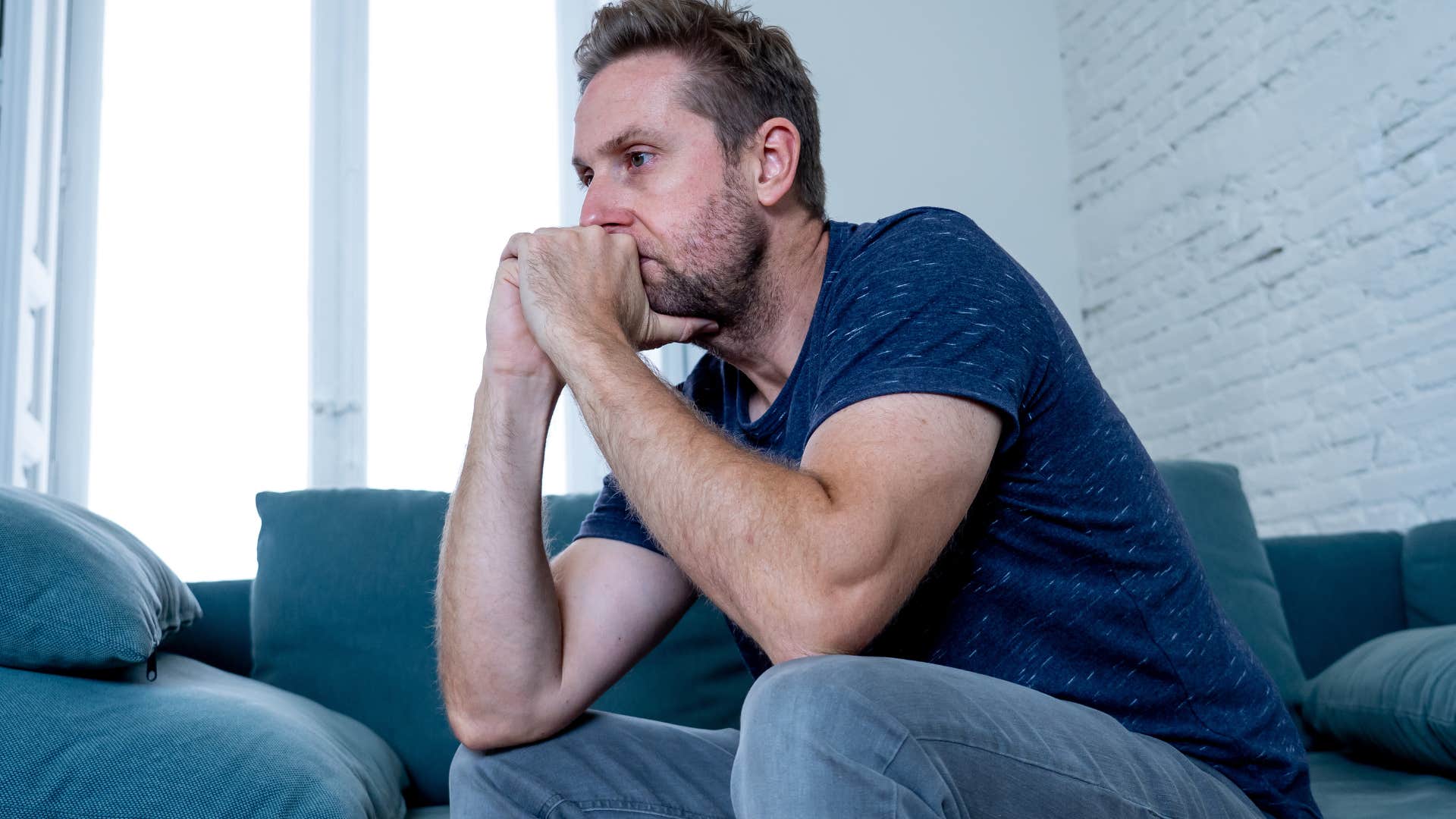11 Signs Someone In Your Life Is Deeply Lonely, According To Psychology
By noticing these subtle changes, you can show up better to support your friends, family, and partner.
 Bordovski Yauheni | shutterstock
Bordovski Yauheni | shutterstock Our social connections have an incredibly impactful impact on our lives, helping to bolster better emotional health, physical well-being, and generally healthy relationships. Without them, as a report from the U.S. Surgeon General explains, we start to experience the negative consequences of isolation and loneliness. Especially for people today, who are living through a “loneliness epidemic,” consistent social connection is more important than ever.
As areas for organic social connection decline, technology and social media become more prevalent, and working structures shift to hybrid models, psychology suggests that everyone should start recognizing the signs that someone in their life is deeply lonely to prevent the cycle of social exclusion that affects all relationships.
Here are 11 signs someone in your life is deeply lonely, according to psychology:
1.They’re sleeping more than normal.
 Stock Unit | Shutterstock.com
Stock Unit | Shutterstock.com
Oversleeping or sleeping more than usual can be a symptom of depression and similar mental health concerns, according to the Cleveland Clinic, that are inherently linked to lacking social connection, isolation, and feelings of loneliness. Primarily, when it feeds into isolation — a cycle that both self-isolates people, represses their emotions, and takes away opportunities for social connection — this tendency can be one of the significant signs someone in your life is deeply lonely, according to psychology experts.
Another study from Psychiatry Research also links isolation and feelings of loneliness to insomnia and a lack of quality sleep in adults. Despite their tendency to sleep more, including more naps due to emotional exhaustion and time during the day, lonely adults often get less restorative sleep.
2.They’re overly critical of themselves.
 SB Arts Media | Shutterstock.com
SB Arts Media | Shutterstock.com
Loneliness, even when hypnotically induced, as a study from the Annals of Behavioral Medicine explains, tends to spark not just depressive symptoms but also feelings of low self-worth and self-esteem. This negative self-perception seeps into lonely people’s daily lives, keeping them from seeking out social connections and feeding into healthy habits that promote confidence and introspection.
This insecurity and low self-esteem isn’t just an internal emotional struggle; it can negatively affect relationships, as well — promoting avoidant and anxious attachment styles, lacking communication, and resentful feelings alongside unmet needs.
3.They don’t respond to texts or reach out.
 DimaBerlin | Shutterstock.com
DimaBerlin | Shutterstock.com
Experiencing less social interaction and connection can be emotionally exhausting. Repressed emotions and internal turmoil build up over time without an outlet for seeking support or help from relationships. Lonely people tend to sleep more, withdraw from relationships, and fail to show up for the people in their lives.
According to the Mayo Clinic, people experiencing isolation tend to grow even more emotionally unavailable in their relationships. While this might be subtle to the people in their lives—through missed text messages, last-minute cancellations, or missed plans—it’s incredibly difficult for them to overcome.
By continuing to reach out, cultivating open and healthy spaces for communication, and giving them grace when they miss a call or an event, the people closest to someone whose struggles can encourage them to return slowly without judgment or criticism.
4.They struggle to concentrate or focus.
 Kateryna Onyshchuk | Shutterstock.com
Kateryna Onyshchuk | Shutterstock.com
If you notice a family member or a coworker struggling to remember simple details or focus on specific tasks, it might be a sign that they’re deeply lonely. While isolation tends to manifest with several physical signs, it also greatly increases the burden of emotional turmoil that unknowingly takes up our brain capacity and focus.
According to a study conducted by researchers at Ohio State University, people experiencing loneliness have higher rates of concentration and memory difficulties than their socially connected counterparts. Of course, loneliness negatively affects not just brain health and cognitive skills but also a sleuth of other physical symptoms like fatigue, headaches, and more serious long-term illnesses.
5.They’re gaining weight.
 New Africa | Shutterstock.com
New Africa | Shutterstock.com
While it’s a sensitive and sometimes utterly unrelated phenomenon — considering some studies contribute weight gain to happiness and comfort in healthy relationships — gaining weight can be a subtle sign someone in your life is deeply lonely, according to psychology. A study from the Cleveland Clinic argues that stress-induced cortisol hormones, which often contribute to weight gain, can increase in lonely people without social connections and healthy relationships.
Along with the presence of other unsettling signs of loneliness, this appearance-based change can also clue close friends and family into a person’s emotional and social struggles.
6.They overanalyze simple social interactions.
 SynthEx | Shutterstock.com
SynthEx | Shutterstock.com
People with low self-esteem, often sparked by loneliness, tend to struggle with social interactions and conversations. They always overanalyze other people’s body language, language, and general energy. Instead of actively listening and being present during conversations, they withdraw to avoid criticism or judgment.
According to a study from Innovations in Clinical Neuroscience, this tendency towards rumination and overanalyzing simple interactions is a coping mechanism for internal distress and anxiety. Concerned with their anxiety about how others perceive them and often stressed over future interactions, lonely people frequently replay simple conversations over and over in their heads.
This tendency makes it hard for lonely people to connect with others in the present moment, sparking a cycle of isolation that feeds into other adverse physical outcomes and emotional distress.
7.They over-prioritize their alone time.
 Perfect Wave | Shutterstock.com
Perfect Wave | Shutterstock.com
While psychology experts like Kendra Cherry suggest that there are emotional and social benefits to prioritizing healthy amounts of alone time to reflect and recharge, many lonely people over-prioritize their need for alone time. Fueled by avoidant attachment styles and anxiety over social interactions, lonely people often insist they prefer to be alone.
While every relationship runs into uncomfortable conversations and not every interaction is apparently “healthy,” this avoidance only feeds into the low self-esteem and anxiety lonely people experience. Without open communication and support from the people in their lives, they only add to their emotional distress with unresolved and repressed emotions.
8.They apologize too much.
 People Images Yuri A | Shutterstock.com
People Images Yuri A | Shutterstock.com
According to clinical psychologist Gregory Chasson, over-apologizing is an anxious tendency that many lonely and disconnected people feel pressured to utilize in their daily interactions. Worried about burdening other people with the emotional turmoil they’re constantly battling, they prefer apologizing for being present.
The basis for healthy connection is communication, the ability to feel understood and respected — when we can’t even provide adequate space for ourselves in our relationships, we’re only self-sabotaging the beauty of fulfilling and impactful interactions.
9.They use self-deprecating humor.
 Ekateryna Zubal | Shutterstock.com
Ekateryna Zubal | Shutterstock.com
Humor can be a helpful tool for navigating complex life changes and events, according to the National Alliance of Mental Illness. Still, when it’s overly relied upon or used in a self-deprecating way, it can be a rather toxic coping mechanism for avoiding communication about how you truly feel.
By putting themselves down for the sake of a laugh, especially in conversations with others, lonely people further isolate themselves and avoid expressing their emotions, creating internal distress in their lives.
While humor can help people bond when lonely people over-rely on it, it further erodes their self-esteem, encouraging people to see them negatively.
10.They struggle with vulnerability.
 Antoniodiaz | Shutterstock.com
Antoniodiaz | Shutterstock.com
It takes genuine practice to build up the courage to be vulnerable in your interactions and relationships, and according to a study published by the American Public Health Association, with more people living alone today, it can be difficult to prioritize those conversations.
Expressing vulnerability can be increasingly difficult, especially for people who are already struggling to stay present during conversations and actively repressing their emotions at home. As a friend or loved one, leading by example can help others feel comfortable doing the same.
When there’s open space for uncomfortable conversation and emotions, lonely people can attempt to share without judgment or an intrinsic burden of guilt for sharing their struggles.
11.They’re working more than normal.
 Ground Picture | Shutterstock.com
Ground Picture | Shutterstock.com
Many lonely people find comfort in working long hours or overtime to avoid social connection and uncomfortable feelings of isolation at home. While productivity and work projects might be a method of escapism and distraction, they can lead to increased risks for cardiovascular disease, anxiety, depression, fatigue, and overwhelming stress, according to a study published in the International Journal of Environmental Research and Public Health.
Feeding into their inability to prioritize social interactions and genuine connection, this distraction makes lonely people feel even more isolated. If you’re noticing a friend or family member actively seeking more work or projects, consider reminding them that you value their company and create space for them to show up.
Zayda Slabbekoorn is a staff writer with a bachelor’s degree in social relations & policy and gender studies who focuses on psychology, relationships, self-help, and human interest stories.

